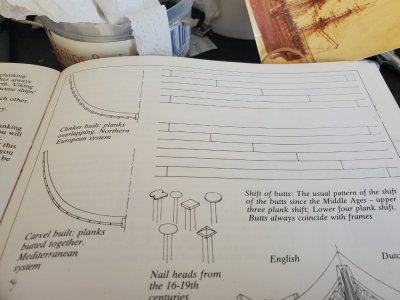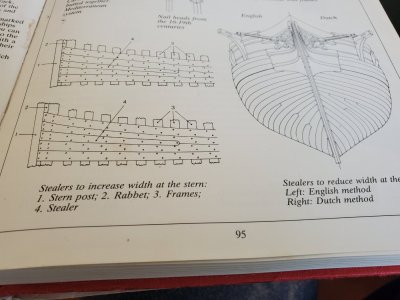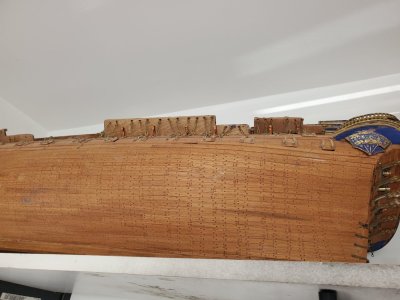-

Win a Free Custom Engraved Brass Coin!!!
As a way to introduce our brass coins to the community, we will raffle off a free coin during the month of August. Follow link ABOVE for instructions for entering.
-

PRE-ORDER SHIPS IN SCALE TODAY!
The beloved Ships in Scale Magazine is back and charting a new course for 2026!
Discover new skills, new techniques, and new inspirations in every issue.
NOTE THAT OUR FIRST ISSUE WILL BE JAN/FEB 2026
You are using an out of date browser. It may not display this or other websites correctly.
You should upgrade or use an alternative browser.
You should upgrade or use an alternative browser.
Deck planking procedure
- Thread starter Ted Robinson
- Start date
- Watchers 14
Duco is nitrocellulose dissolved in acetone. Nitrocellulose is gun cotton. There is no chemical reaction involved with its bond. Apply wet- in solution - when the solvent evaporates, the dry nitrocellulose is the bond. Acetone will reverse the bond.
A virtually cost-free substitute for Duco Cement can be made by dissolving styrene plastic in acetone to a dissolved solution reaches your desired thickness. This is a great way to "recycle" Styrofoam packing "peanuts," block packing materials and foam drinking cups, etc. Styrene plastic parts sprues can also be dissolved in acetone in the same way. Gasoline will also work, but I don't advise using gasolene simply because it has a flash point two to three times lower than acetone.
By varying the thickness of the resulting mixture as the plastic is dissolved in the acetone, one can create a waterproofing coating that can be painted on wood or used to "plasticize" cardstock, an adhesive equivalent to "thin" "regular" or "thick" consistency plastic model cement similar to Duco nitrocellulose cement, and so on. thickened mixtures can also be used for casting polystyrene parts. Store in a tightly capped bottle or, if you have one, a tightly capped metal container which will not break like glass if dropped. Obviously, mixing and storage in polystyrene plastic containers isn't advised!
"Drying" time is extremely fast, owing to acetone's high volatility. Acetone will reverse the bond, of course. Mix and use in a well-ventilated area.
- Joined
- Oct 1, 2023
- Messages
- 1,985
- Points
- 488

Thank you for the primer on glues.Not true in my experience. The vehicle for PVA is water. If a particular version is too thick, dilute with water. But not as much as might be imagined - Think in the range of 10% more water. PVA is acidic. The more water resistant is the final bond, the more acidic is the product. Titebond II is pH 3. Off the shelf vinegar is pH 2.4. The solvent that reverses a PVA bond is an alcohol. The most effective one is 2-propanol - isopropyl. Pharmacies here have 70% and 91%. The 91% is the better choice. Amazon has 99% Swan for $7/pt. if you wish to dissolve Shellac flakes in a solvent with a slightly longer wet time than 95% ethanol - Shellac thinner.
A PVA bond involves a chemical reaction - forming long chains. Alcohol untangles the chains but the reaction product stays the same new larger compounds.
There is white PVA - polymerizes water clear - yellow PVA - carpenters glue - polymerizes amber clear. It is more acidic and produces a stronger bond - Titebond II is a yellow PVA with additives for a water resistant bond - LA may not know from humidity, but over here on the southern Atlantic coast we do. Titebond III is forms a "waterproof" bond - It polymerizes brown. It is pH 2.5. (If it was something that is made of wood and I would float in it - I would still use resorcinol glue - something that would set your political nannies hair on fire.) There is a pH 7 white PVA (bookbinders). This is for rigging that is plant fibers twisted up.
Duco is nitrocellulose dissolved in acetone. Nitrocellulose is gun cotton. There is no chemical reaction involved with its bond. Apply wet- in solution - when the solvent evaporates, the dry nitrocellulose is the bond. Acetone will reverse the bond.
Do they allow rubber cement? The solvent - thinner is n-heptane. (7) gasoline has octane (8) - Are you allowed gasoline? Jibes aside - quality rubber cement like True Test is excellent for fixing patterns to wood. Coat both surfaces - a significant and through coat - let dry - stick together - no adjustment - instant bond. Your thumb can completely remove dry rubber cement from a wood surface. Rolls into rod.
This is also the same process with contact cement - DAP Weldwood contact cement - which is a really poor choice as a model component adhesive, a really really poor choice. In construction, it is good for any bonds that you do not mind coming apart after 20 years - it probably oxidizes to become so brittle.
I would not touch CA with a ten foot pole. It uses water as its reaction catalyst. I am having the thought that the more water the wood has at its surface, the quicker is the CA reaction. It has volatile components that are decidedly unhealthy. You cannot get acetone but can you get CA? If yes - there is a strange sort of logic involved. CA has a strong vertical bond (pull apart). The lateral (sheer force) bond strength is not so good. Acetone will reverse its bond. Perhaps the humidity in LA is low enough that a bottle of CA will not start reacting in it container as soon as it is exposed to the atmosphere?
Your tongue in cheek brightened my day.
Our nannies allow/regulate that alcohol is in our gasoline. Irony is totally lost on them and their hypocrisy is never recognized.
- Joined
- Oct 2, 2025
- Messages
- 174
- Points
- 78

Denatured alcohol is 95% ethanol with an added emetic chemical to make ingestion an unpleasant experience. It is exempt from the moonshine tax. Your local liquor store sells the same 95% ethanol without the emetic but with the tax. Everclear? When I was a pup it was Pharmco grain - involved in tall frat tales about what purple passion could do.I can't but denatured alcohol in los Angeles county
Ethanol and water produce an azeotrope. The highest concentration of ethanol possible from simple distillation is 95%. Going the extra step of distillation from benzene (or whatever) will produce 100% ethanol. Unless it is in an atmosphere with zero humidity, as soon as it is exposed to the atmosphere, water vapor will migrate in and reform the azeotrope. In probably not much time it is back to 95% ethanol. To be practical, 100% ethanol is probably not worth the time and expense.
- Joined
- Oct 1, 2023
- Messages
- 1,985
- Points
- 488

I only checked online at Ace Hardware and Home Depot.As a fellow Californian, I share your frustration with the unavailability of many once-common products, primarily due to air quality control ordinances limiting the sale of high-VOC content solvents in "The Land of Fruits and Nuts." (In the spirit of full disclosure, we do have serious air quality issues that we have to stay on top of.) Nevertheless, I'm surprised by your report that you cannot purchase denatured alcohol in Los Angeles County. A google search indicates there are no prohibitions on denatured alcohol in California or locally in Los Angeles County. It is not at all restricted in the San Francisco Bay Area where I live and we've got the some of the strictest restrictions in the nation up here. "Denatured alcohol" is also sold labeled as "alcohol stove fuel" and fuel for chafing dishes and the like. I keep pretty close tabs on what's available in the solvent department of local hardware and paint stores. I'd urge you to take another look in the paint department for denatured alcohol which is usually sold in quart, gallon, and five gallon cans in most every place where paint thinner, acetone, and other solvents are sold. The methamphetamine chefs are still buying acetone in five gallon cans at the local Ace Hardware stores, so I expect alcohol is still available.If not, grab a gallon can at any paint or hardware store the next time you're out of LA County. It's a workshop staple.
Curious- Can one buy fingernail polish removed in LAC? That has Acetone in it, granted a bit diluted, but it will dissolve CA, just not quite as fast as straight Acetone. Someone mentioned vinegar. Stores like Home Depot and Lowe's, and maybe TrueValue and Ace as well, sell 30% for weed control (1gal. jug). I also use vinegar (white, distilled) instead of MicroSet for setting decals. Much cheaper.Do you desolve the glue with acetone.
I can't but denatured alcohol in los Angeles county. We're being "protected" by our mayor and governor.
- Joined
- Oct 1, 2023
- Messages
- 1,985
- Points
- 488

We can buy finger polish remover. That's what I have been using.Curious- Can one buy fingernail polish removed in LAC? That has Acetone in it, granted a bit diluted, but it will dissolve CA, just not quite as fast as straight Acetone. Someone mentioned vinegar. Stores like Home Depot and Lowe's, and maybe TrueValue and Ace as well, sell 30% for weed control (1gal. jug). I also use vinegar (white, distilled) instead of MicroSet for setting decals. Much cheaper.
No logic behind their rulings.
I live in the San Fernando valley in LA.
Our last administration dumped almost one million illegals here in the past few years. They turned our city into a hell hole.
We don't want to move out of state away from the grandchildren.
- Joined
- Feb 15, 2019
- Messages
- 385
- Points
- 168

Assuming you haven't started planking I would bin it and buy decent timber. I rarely use supplied materials for that reason.I don't know what wood is used for the ZHL San Felipe kit. It is extremely porous.
When testing stain colors and building a deck planking sample i found the stain bleeds through to the underside of the plank. When building the deck planking sample I found that both the PVA and CA glues bleed through to the surface.
I don't want the shiny surface created by the CA bleedthrough. I'm afraid of the splotchy finish created by the PVA bleedthrough.
I'm also afraid to prefinish the deck planks prior to installation because I won't be able to glue subsequent deck furniture.
See prestained deck plank below. It was stained with Minwax Golden Pecan oil based.
Any advice is sincerely appreciated.
Ted
View attachment 554317
- Joined
- Jul 24, 2016
- Messages
- 524
- Points
- 188

hiI don't know what wood is used for the ZHL San Felipe kit. It is extremely porous.
When testing stain colors and building a deck planking sample i found the stain bleeds through to the underside of the plank. When building the deck planking sample I found that both the PVA and CA glues bleed through to the surface.
I don't want the shiny surface created by the CA bleedthrough. I'm afraid of the splotchy finish created by the PVA bleedthrough.
I'm also afraid to prefinish the deck planks prior to installation because I won't be able to glue subsequent deck furniture.
See prestained deck plank below. It was stained with Minwax Golden Pecan oil based.
Any advice is sincerely appreciated.
Ted
View attachment 554317
Decking should be Smooth which your is but it needs but the planks should never end in points anywhare
They cannot be fixed onto the hull
If you have a second layer of planking cut into equal lengths of about 5" 8cm
A main plank (Garboard Strake) should run along from the Stern STAIGHT along the keel and end up cut into the keel before it starts lifting beforn the stem I would then start at the lower level of GunPorts and fill in as much as you can down the side of the ship with no trimming of ends
Dont forget to do both sides
Then fil in towards the stem with solid planks
Then use steelers to fill in the gaps
The Dutch use A DIFFERENT method to the English
Illustrations are from Historic Ship Models by zu Mondfeld The One Book every modeller should have
If you use the right wood it should not need staining
My San Felpipe showing the best Planking i ever did



- Joined
- Jul 24, 2016
- Messages
- 524
- Points
- 188

remember ships where holystoned so remained very lightAssuming you haven't started planking I would bin it and buy decent timber. I rarely use supplied materials for that reason.
Hi Ted
All these postings are great and very educational. So I will only post "my own real life modeler experience".
- I always planked my decks when they are already on the ship OR before gluing them onto the ship.
- on any of those 2 situations, after the planks are glued, I STAINED or used POYURETHANE or VARNISH for the deck planks.
- I never had a problem to glue something over any of those surfaces (stains, polyurethane or varnish).
- Superglue and or Wood glue or mixing both always worked "for me".
I encourage you to pick up a piece of wood, Varnish it or use polyurethane. Let it dry and then glue another piece of wood over it. Let it dry and check the results.
Cheers
Daniel
PS: Why I sometimes use superglue mixed with wood glue?
My hands shakes a little when doing fine jobs. The PVA provides support helping me to place the piece and the CA adds speed of gluing. I place the PVA on the piece to be glued and a drop of CA on the place where it will be glued.
All these postings are great and very educational. So I will only post "my own real life modeler experience".
- I always planked my decks when they are already on the ship OR before gluing them onto the ship.
- on any of those 2 situations, after the planks are glued, I STAINED or used POYURETHANE or VARNISH for the deck planks.
- I never had a problem to glue something over any of those surfaces (stains, polyurethane or varnish).
- Superglue and or Wood glue or mixing both always worked "for me".
I encourage you to pick up a piece of wood, Varnish it or use polyurethane. Let it dry and then glue another piece of wood over it. Let it dry and check the results.
Cheers
Daniel
PS: Why I sometimes use superglue mixed with wood glue?
My hands shakes a little when doing fine jobs. The PVA provides support helping me to place the piece and the CA adds speed of gluing. I place the PVA on the piece to be glued and a drop of CA on the place where it will be glued.
- Joined
- Feb 15, 2019
- Messages
- 385
- Points
- 168

Royal Navy ships were holystoned! Indeed. But French and Spanish!!?? They were considered disgusting by our tars! Even a woodstain would be too uniform to be realistic. If I were to build one as a diorama I'd treat it like an old fishing boat.remember ships where holystoned so remained very light
- Joined
- Oct 1, 2023
- Messages
- 1,985
- Points
- 488

Your mode.l is really nicehi
Decking should be Smooth which your is but it needs but the planks should never end in points anywhare
They cannot be fixed onto the hull
If you have a second layer of planking cut into equal lengths of about 5" 8cm
A main plank (Garboard Strake) should run along from the Stern STAIGHT along the keel and end up cut into the keel before it starts lifting beforn the stem I would then start at the lower level of GunPorts and fill in as much as you can down the side of the ship with no trimming of ends
Dont forget to do both sides
Then fil in towards the stem with solid planks
Then use steelers to fill in the gaps
The Dutch use A DIFFERENT method to the English
Illustrations are from Historic Ship Models by zu Mondfeld The One Book every modeller should have
If you use the right wood it should not need staining
My San Felpipe showing the best Planking i ever did
View attachment 555510
View attachment 555511
View attachment 555512
- Joined
- Jul 24, 2016
- Messages
- 524
- Points
- 188

built in when wood was really goodYour mode.l is really nice
Panart
JUst a bit disappointed that others arnt as good
Given up on my L Victory Wood is farv too thick
But thansk
- Joined
- Oct 1, 2023
- Messages
- 1,985
- Points
- 488

If you're referring to Artisiana Latina I've built two of their kits and found the wood to be garbage.built in when wood was really good
Panart
JUst a bit disappointed that others arnt as good
Given up on my L Victory Wood is farv too thick
But thansk
- Joined
- Sep 25, 2025
- Messages
- 9
- Points
- 3

If people are unaware, Titebond manufactures a superglue specifically for wood.
- Joined
- Jun 16, 2018
- Messages
- 16
- Points
- 58

I have been using Titebond II since I began all this. It has served me well. PVA bonds by building chains that grab an irregular wood surface and penetrate pores. The closer are the two wood surfaces, the stronger is the bond. PVA does not bond to a smooth surface - like metal - or a wood surface sanded much finer than 220-240 grit. 120 is probably better but 220 is a compulsion of mine. A shellac primed surface offers no tooth.
I have to disagree on several statements here, base on my years of being a Luthier.
1. For the purposes of building wooden model ships, any pva glue will work, no point in spending extra money. Your prerogative.
2. PVA glue bonds on a molecular level. Here is a brief excerpt of a write up I did a few years back.
"one needs to understand that glue bonds on a molecular level, that is to say that the molecules of glue, link to the molecules of wood. Thus, anything that gets between the surface molecules to be bonded, like dirt or oils from you fingers will hinder the bond. You often hear, "roughen up the surface first before gluing" with many people thinking that the glue will make little hooks into the roughened surface and bond better. This is false, glue alone has very little strength. What roughening up the surface does is expose a clean surface and increase the dimensions of the gluing area. So, the best glue bond one can make will be one that is perfectly mated together (I generally test my joints with a 1 to 2/1000th inch feeler gage), is absolutely clean (I wipe with denatured alcohol or acetone depending on the wood species) and is not starved for glue. So with that in mind, a strong build will be one that has proper glue bonds".
3. A spit coat of shellac is an excellent conditioning for wood, especially when applying oil based stains on "known" blotchy wood species.
- Joined
- Jul 24, 2016
- Messages
- 524
- Points
- 188

might be for wood but not for stained wood and if not cleaned of propely stops a decent stain and varnishIf people are unaware, Titebond manufactures a superglue specifically for wood.

